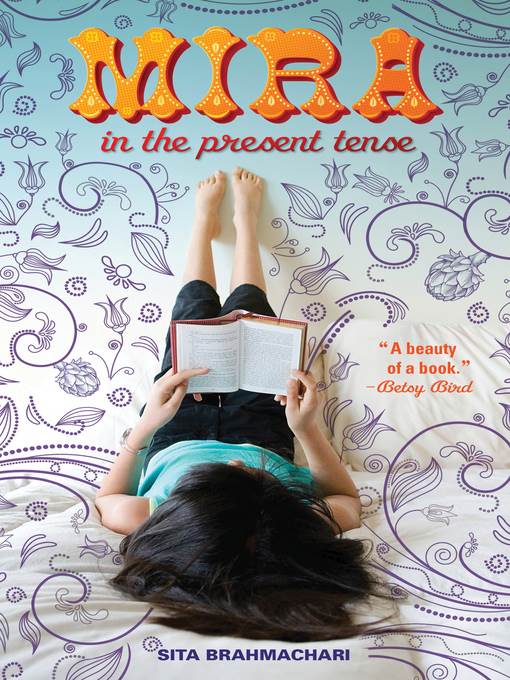
Mira in the Present Tense
فرمت کتاب
ebook
تاریخ انتشار
2013
Lexile Score
870
Reading Level
4-5
نویسنده
Sita Brahmachariشابک
9781480449688
کتاب های مرتبط
- اطلاعات
- نقد و بررسی
- دیدگاه کاربران
نقد و بررسی

August 5, 2013
Originally published as Artichoke Hearts in the U.K., where it won the Waterstone’s Children’s Book Award in 2011, Brahmachari’s debut novel is worth the heartache it provokes. Londoner Mira Levenson, who’s of Indian and Jewish descent, gets her first period on her 12th birthday, the same day that her grandmother’s coffin shows up at the door; they plan to decorate it before Nana’s imminent death from cancer. Mira is generally introspective and bashful, but the instructor at a writing workshop encourages Mira to shed her self-consciousness and speak boldly. To Mira’s surprise, she has plenty to say—about her fellow writer and romantic interest Jidé, who narrowly escaped death in Rwanda; about her best friend Millie, whom she no longer confides in; and about her caring but often overwhelming family. Readers will enjoy watching Mira gather strength through writing in her diary and confronting her fears. While the story deals with the heaviness and “necessary heartbreak” of losing a close relative, Mira’s energetic voice reminds readers that inspiration and hope can be found in the everyday. Ages 9–13.

July 15, 2013
Puberty, first love and a grandparent's death figure in this gentle coming-of-age debut from the U.K., winner of Waterstone's Children's Book Prize in 2011. On her busy 12th birthday, Mira, a budding artist of Indian-Jewish heritage, gets her first period, dreams about the Rwandan boy in her writing class and agrees to help her ailing Nana Josie paint her coffin. Among her presents is a diary in which she'll record her next five weeks. Like Judy Blume's Margaret, Mira desires and fears growing up, but there the two part ways. Grappling with life's big questions, Margaret finds adult answers unsatisfactory, conflicting and contradictory; disillusioned, she'll find her own. Mira's journey is less stressful than reflective, studded with mature insights and wry reflection as she absorbs life lessons from her elders, especially Nana Josie, who, having lived a full life, now orchestrates her approaching death. (Movingly portrayed in realistic detail, her looming death and Mira's sorrow are the novel's strong suit.) Title notwithstanding, Mira's passivity and the largely conflict-free plot are distancing. Because readers first learn that Mira's bullied two pages before she fights back, her triumph has little impact. Growing up, like birth and like death, involves struggle, but Mira's largely spared its messy, painful side; this is adolescence as adults would like it to be, not as children live it. (Fiction. 9-13)
COPYRIGHT(2013) Kirkus Reviews, ALL RIGHTS RESERVED.

October 1, 2013
Gr 6-8-Mira's year seven is a time of discovery and growth during which she experiences first love and first loss. Pat Print, author and children's book reviewer, comes to the 12-year-old's London school to conduct a writing workshop and to learn more about young people's reading habits. Mira is excited to keep a journal as Pat asks since she has just received a diary as a birthday present. Nana Josie, who is ill, gives her a special bracelet charm, not just for her birthday but to pass along a piece of family history. The Levensons are all artistic, but it is Mira who helps Nana paint beautiful images on her plain white coffin. Nana's pain grows more constant as cancer continues to take her energy and, ultimately, her life. The decorated casket helps friends and family of Mira's much-loved paternal grandmother recall the things of this world that Josie enjoyed and loved, evoked and celebrated. Through writing, experience, and developing friendships, Mira comes to know her classmates and her own strength as never before. Her infatuation with Jide, orphaned in Rwanda, grows into first love through shared grief, hope, and mutual respect. The story is told in Mira's voice, and readers will be affected by her growing awareness and sophisticated, often philosophical musings about religion, family, and growing up, and observations generated by her East Indian and British background. Characters, including adults, have complex emotions. Although pacing is a bit slow at times, the novel's emotional intensity and honesty are likely to propel readers to the satisfying, if not entirely happy, resolution.-Maria B. Salvadore, formerly at District of Columbia Public Library
Copyright 2013 School Library Journal, LLC Used with permission.

























دیدگاه کاربران